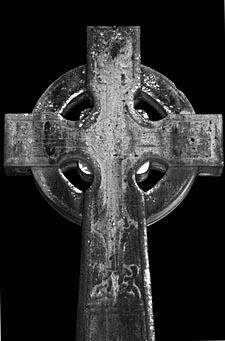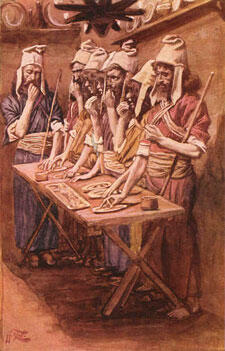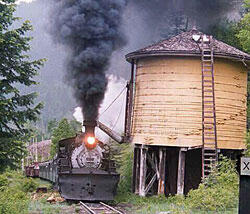
After endless weeks recently of watching Tom Cruise air-box, jump on chairs, pontificate on depression, and talk about the idiocy of
Scientology, it’s definitely refreshing — yea, one might even say a veritable
antidepressant — to have some sanity expressed by another celebrity who appears to have a more rational cerebrum (although, granted, not as much of a pretty boy). Here is an intriguing quote from
Bono, of
U2 fame, in his book
Bono in Conversation:
It’s a mind-blowing concept that the God who created the Universe might be looking for company, a real relationship with people, but the thing that keeps me on my knees is the difference between Grace and Karma. . . .You see, at the center of all religions is the idea of Karma. You know, what you put out comes back to you: an eye for an eye, a tooth for a tooth, or in physics, in physical laws, every action is met by an equal or an opposite one. It’s clear to me that Karma is at the very heart of the Universe. I’m absolutely sure of it. And yet, along comes this idea called Grace to upend all that: “as you reap, so will you sow” stuff. Grace defies reason and logic. Love interrupts, if you like, the consequences of your actions, which in my case is very good news indeed, because I’ve done a lot of stupid stuff…
I’d be in big trouble if Karma was going to finally be my judge. I’d be in deep sh-t. It doesn’t excuse my mistakes, but I’m holding out for Grace. I’m holding out that Jesus took my sins onto the Cross, because I know who I am, and I hope I don’t have to depend on my own religiosity.
I love the idea that God says: Look, you cretins, there are certain results to the way we are, to selfishness, and there’s mortality as part of your very sinful nature, and let’s face it, you’re not living a very good life, are you? There are consequences to actions. The point of the death of Christ is that Christ took on the sins of the world, so that what we put out did not come back to us, and that our sinful nature does not reap the obvious death. That’s the point. It should keep us humbled. It’s not our own good works that get us through the gates of Heaven.
It’s a bit unsettling when Karma and Christ get mentioned in the same breath — by a rock star never seen without his wrap-around shades and so-cool demeanor — in a literary aside laced with the appropriate profanities, moreover — and it’s one of the clearest expressions of how the world works you’ve heard in months. God’s a very funny guy sometimes, and uses rather peculiar mouthpieces — which gives me great hope indeed.
I once had an online discussion with a young man from England, an agnostic, who maintained that all religions were the same: they all had their rules, and if you followed the rules, you got rewarded. Hence, there was no difference which religion you chose — pick one you like, stick to it, and you may get some reward at the end. I agreed with him, with but one exception: Christianity. How so, he asked, skeptically? Because most religions tell to
do something different to be right with God; Christianity says you must
become someone different.
This is the difference between Karma and Grace.
Karma’s about
the Rules: do this, and that will happen; don’t do that, or this other will happen. It is, by and large, the way the world works — especially religion. Cause and effect, action and reaction, crime and punishment, yin and yang. In a theistic worldview — one which assumes there is a Being or Beings to which man is ultimately answerable — Karma is in effect one giant accounting exercise: do more good than evil, and you go to heaven, or reach Nirvana, or achieve some sort of eternal peace or rest. Do more evil than good, well there’s Hell, or Purgatory, or reincarnation as a rodent or Lyndon Johnson’s beagle, or Britney Spears, or perhaps — at the very best — just get annihilated — poof!!
But there’s a few problems with the Karmic system, as I see it. First of all, everybody’s rules are different, so
whose rules apply? Seems like you’ve gotta get that right — do you meditate on your navel in the Himalayas, join a Trappist monastery, worship your ancestors, or strap on the ol’ C4 and mosey into the pizza parlor for one last blowout? Seems to me that might make just a
bit of difference when your audit comes up with the Great Accountant. And where’s the break point, the marginal tax rate, so to speak — the point at which, if I do
one more good thing, I pass, or don’t do it, and
damn — nice try — hope ya’ like really,
really hot food? You see, I want to know
exactly where that point is — after all, you don’t want to run around doing namby-pamby do-goody-type stuff if you’ve
already got your ticket home,
ya’ know what I mean, Vern? But nobody — and I mean
nobody — tells you where that point is. You have to
guess. And that leads to another little problem, now that you mention it.
You see, like most people — pretty much everyone, actually — I’m a lousy accountant: in my moral bookkeeping, I greatly inflate my assets while offloading most all of my liabilities to an offshore corporation — I make Arthur-Anderson’s Enron books look like Mother Theresa’s prayer journal. Not good, if you’re trying to make it to that heavenly break point two breaths before the Grim Reaper arrives. And when you finally reach the Great Audit in the Sky, it’s a little late to cook the books or give a few more old clothes to charity.
I remember watching an interview with double-murderer
Gary Gilmore, before his execution. He told the interviewer he didn’t believe he was a bad person “because I never tortured anybody.” Bad accounting, Gary — even OJ’s lawyers couldn’t help you beat
that rap. But frankly, my accounting ain’t that much better — and I’d be willing to bet yours isn’t either.
And what if the magical good/bad break point is just
slightly more than 51% good, 49% bad — oh, say,
100% good, and
0% bad?
Whoa, dude!! — you are
seriously screwed — who’s gonna pass
that class? That’s like nuclear physics 501, and
Albert Einstein’s in your class, and the teacher’s
gradin’ on a curve. Holy Shiite! Time to drop out and audit The Cultural History of Rap — for no credits. But if the Ultimate Being happens in fact to be perfect, all goodness, no evil, He ain’t lettin’ no riffraff in the door. No trackin’ mud on those Snow White heavenly carpets, no sirree. Fuggeddaboutit. And if the Grand Auditor is
not all good — perhaps He has a cynical, twisted sense of humor, and likes playing mean tricks on His heavenly guests, or is capricious and moody — getting in the door could be an eternal case of terminally bad judgment — or bad Karma, if you will.
So Karma is the ultimate crap shoot — and the dice are loaded: the house has all the odds.
But what if you don’t buy all this heaven/God/reward/punishment stuff? All ignorance and superstition, designed to control the masses and line the pockets of the clergy, to be sure. Being a multiculturally inclusive kinda guy, I surely have no desire to depreciate you, and want to value your narrative as well — in fact, I would even add one more category —
just for you — to Bono’s worldview: the
Nihilist.
Ahhh, the nihilist — so enlightened, so intelligent, so skeptical. Truly a 21st century postmodern man in every sense.
Nobody tells him or her what to do — the rules exist for others. All those archaic do’s and don’ts which have guided people for the past few millenia are outdated, oppressive, the product of ignorance and superstition and the will to power:
no one’s gonna force
their values down
my throat, keep
your rosaries off
my ovaries, live and let live, and whatever doesn’t hurt somebody else (narrowly defined, of course) is OK by me, and OK for me. I didn’t do anything wrong if I don’t get caught. The nihilist doesn’t worry about the Rules because the nihilist
makes the rules. Tolerance is the Golden Rule — which means nobody gets to tell
me what to do, and in return I let you do whatever
you like — unless, of course, you’re one of those religious, intolerant types. Sweet deal, really.
Only one problem: old lady Karma won’t leave the premises just because
you don’t believe in her. Ideas have consequences, and behavior repercussions. You’re running your own show like a pro, making up the rules as you go, but for some reason that third marriage is kinda rocky — the princess just doesn’t understand
my needs. Your kids are stoned, surly, and pierced in places they didn’t teach you about in health class — and despite your best efforts to buy them off, they still hate your guts. Your career is great, but for some reason all those co-workers you used and screwed on your way up just don’t
appreciate your awesome talents. Those a-holes at the IRS are hassling you —
of course that tryst with your secretary was solely for business purposes. The new wife, the new car, the new job, the new palace are great for your image — and fortunately, the Prozac and the single-malt help take the edge off that uneasy dissatisfaction that festers deep within despite all your
stuff. You spend all your time and energy molding the world into your own image — but none of this is enough, it goes from bad to worse, from unhappy to miserable — and it’s pissin’ you off. The raging two-year-old inside makes mommy go away by tightly squeezing his eyes closed — but doesn’t prevent the wack to your naughty bottom. Karma is alive and well, and she knows where you live.
So whether you’re buying it or not — and in whatever form you choose if you do — Karma’s here to stay. That is, unless you find Grace.
Grace is a disgrace to the logical mind — it’s just so, well,
unfair, so un-American. After all, we get what we deserve and earn what we get — God helps those who help themselves, and all that. But grace intervenes when we arrive at the point where we
cannot help ourselves — or worse, when our best self-help program has impossibly screwed up our lives. Grace gives you what you haven’t earned, and doesn’t give you what you justly deserve. Grace is scandalous, insulting, humiliating, an affront to our pride — indeed, it is the very
enemy of our pride.
Everything we do to fix ourselves, to control our lives and those around us for our own gain and benefit, is at once both natural and self-destructive. It is
natural because our inborn drives are self-protective — call it natural selection, call it survival of the fittest, call it enlightened self-preservation, call it selfishness and self-centeredness. It’s me first, and the hell with you. Of course, we wrap this up in social niceties because we live in a world with other people — people who can do us harm if we step on their toes too hard. But even this is fundamentally self-preserving. We are born to take care of ourselves, first and foremost.
But it is
self-destructive, in ways that are not always obvious. We are
social beings, designed for relationships: we reserve solitary confinement for our most reprobate criminals; loneliness is the deepest of emotional pains. We are not crafted to be self-dependent, but
interdependent. But we are possessed of the notion — inherently
anti-social — that self trumps other. And our mental skills are such that we can rationalize, deny, minimize, excuse the harm done to others in the name of self. Self-serving brings temporary relief but long-term misery: it is a proven path to an unhappy, unsatisfying life.
And that is why Grace is revolutionary.
Grace says someone else can do it better than you — if only you ask. Its message is an affront: it says we do not have all the answers — and the answers we
do have are wrong — often disastrously so. Grace does not excuse our wrongs — it
covers our wrongs. It doesn’t nullify Karma — it simply puts the bill on someone else’s tab. When we
receive grace,
someone else is bearing the price, the consequences for the hurt and the harm we have done. When we
give grace, we choose to pick up the tab for another’s shortcomings, wrongdoing, destructiveness, evil. And that’s where we draw the line: we are happy to receive grace, but it is too much to ask of us to give it in return.
And that is the roadblock — ironically — which we need Grace to overcome.
What is needed is a core inner transformation: we must
become someone different. We are hard-wired to take — we need to be
transformed to give. Trying to be other-oriented — following the rules, being a good person —
without this transformation is counter-productive: it breeds resentment, self-righteousness, pride, self-sufficiency. But this inner transformation
cannot be brought about by ourselves — it must come through others, and above all, from Another. But once this happens —
and our will must be broken before it can — the miracle of motive change begins to take place.
When I act, I do so for one of two reasons: I do so because I
have to, or I do so because I
want to. While these motives may overlap, it is — not surprisingly — much easier to do the things I
want to do than those I
have to do. Karma is about doing that which I
have to do — to placate a demanding God, to save my own skin. The miracle of grace is the willingness — the desire — to do that which is
contrary to my nature, yet beneficial to my spirit.
Yet grace does not instantly transform — it seems rather to thrive in the fertile manure of failure. Those who grasp grace still fail at marriages, have rebellious children, hurt others, act selfishly, pursue wealth and the material. But the seditious espionage of grace slowly erodes the forces that drive these disasters, changing — from the inside out, one small step at a time — the corruption of self to the contentment of service. Failure — the judgment and condemnation of Karma — becomes the very seed of recreation, of new life: from the stench of manure will grow the fragrance and beauty of a flowering garden.
The choice is ours. If we are unfortunate enough to be self-sufficient, strong in our determination to survive on our own, to meet our own needs in our own way, we will live under the painful lash and uncertain future of Karmic fortune. If instead we find, in honesty, our emptiness and weakness — and turn to only One who can fill these yawning chasms with grace — then a world beyond our imagining, filled with purpose, peace, and wonder, awaits us.
The choice is important — choose wisely.
 Ancient wisdom: a sage injunction uttered in a time when simple shepherds and farmers parsed out land for grazing and grain, speaking to the prudence of respecting contracts, negotiated agreements with those with whom we live, to abide in a measure of peace. Be honest; respect the property and possessions of those with whom you must abide; do not trade peaceful relations for parcels of land.
Ancient wisdom: a sage injunction uttered in a time when simple shepherds and farmers parsed out land for grazing and grain, speaking to the prudence of respecting contracts, negotiated agreements with those with whom we live, to abide in a measure of peace. Be honest; respect the property and possessions of those with whom you must abide; do not trade peaceful relations for parcels of land.


 It was, at the outset, about direction. Direction demands trust.
It was, at the outset, about direction. Direction demands trust.
 As wrecks go, it was not all that spectacular: some broken glass on the roadway, a few police cars, their rooftop strobes painting the night walls of nearby buildings with surreal dancing figures of light, red and blue. The SUV sat on a flatbed, with little apparent damage; the less fortunate compact, compacted on the passenger side. No apparent injuries, no ambulance, no stretchers.
As wrecks go, it was not all that spectacular: some broken glass on the roadway, a few police cars, their rooftop strobes painting the night walls of nearby buildings with surreal dancing figures of light, red and blue. The SUV sat on a flatbed, with little apparent damage; the less fortunate compact, compacted on the passenger side. No apparent injuries, no ambulance, no stretchers.
 In my previous post on guilt and shame, I discussed their nature and differences, their impact on personal and social life, and their instrumentality in much of our individual unhappiness and communal dysfunction. If indeed shame is the common thread of the human condition–fraught as it is with pain, suffering, and evil–it must be mastered and overcome if we are to bring a measure of joy to life and peace to our spirits and our social interactions.
In my previous post on guilt and shame, I discussed their nature and differences, their impact on personal and social life, and their instrumentality in much of our individual unhappiness and communal dysfunction. If indeed shame is the common thread of the human condition–fraught as it is with pain, suffering, and evil–it must be mastered and overcome if we are to bring a measure of joy to life and peace to our spirits and our social interactions.
 After endless weeks recently of watching Tom Cruise air-box, jump on chairs, pontificate on depression, and talk about the idiocy of
After endless weeks recently of watching Tom Cruise air-box, jump on chairs, pontificate on depression, and talk about the idiocy of